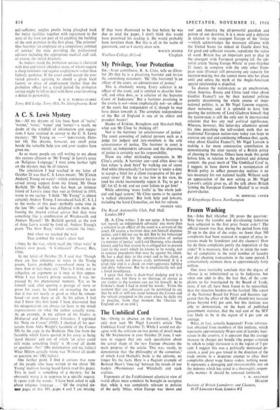The Umbilical Cord
SIR,—Owing to absence on the Continent, I have only now seen Mr Nigel Lawson's article 'The Umbilical Cord' (October 7). While I would not dis- agree with the criticism on two points of detail made by Mr Swynnerton in your October 28 issue, I ven- ture to suggest that any such speculation about the actual shape of the new Europe obscures the main purpose of the article. This was, surely, to demonstrate that 'the philosophy of the consensus,' of which Lord Harlech's book is the epitome, no longer fits the facts. Here is a flagrant example of Bernard Shaw's lime-lag' between the minds of our leaders (Westminster and Whitehall) and stark realities.
Exponents of the Establishment atlanticist view of world affairs must somehow be brought to recognise that, while it was completely relevant to policies of the early 'fifties, when Europe was 'down and out' and America the all-powerful guardian and patron of our destinies, it is a snare and a delusion in relation to the resurgent Europe of the 'sixties —which acknowledges the necessary alliance with the United States (as indeed de Gaulle does) but, for good and sufficient reasons, repudiates the status of ward. Britain has an important part to play in the emergent wide European grouping (cf. the edi- torial article 'Seeing Europe Whole' in your October 21 issue), in company with the only other Euro- pean state (France) still possessing any capacity for decision-making, but she cannot move into her place until and unless the myth of the Anglo-American special relationship is dispelled.
To dismiss the nation-state as an anachronism, when America, Russia and China (and what about Gaullist France?) are by their national policies patently determining the whole course of inter- national politics, is, as Mr Nigel Lawson suggests, sheer nonsense; and it is splendid to have him quoting the testimony of Lord Gladwyn himself that the nation-state is still the only unit in international relations that has any real political significance. Whereas, however, this latter-day atlanticist spends his time preaching the self-evident truth that no traditional European nation-state today can hope to exercise any real and continuing influence (but, again, what about Gaullist France?), Mr Nigel Lawson is making a far more constructive contribution in demonstrating the utter vacuity of a British policy of cleaving to America. Others have made this point before him, in relation to the political and defence context: the great merit of 'The Umbilical Cord' is, I suggest, to have shown how a reorientation of British policy to reflect present-day realities is no less necessary for our national health. Without such an appreciation of the new setting as Mr Nigel Lawson's article gives us, all the talk about Britain 'joining the European Common Market' is so much parrot-chatter.






































 Previous page
Previous page